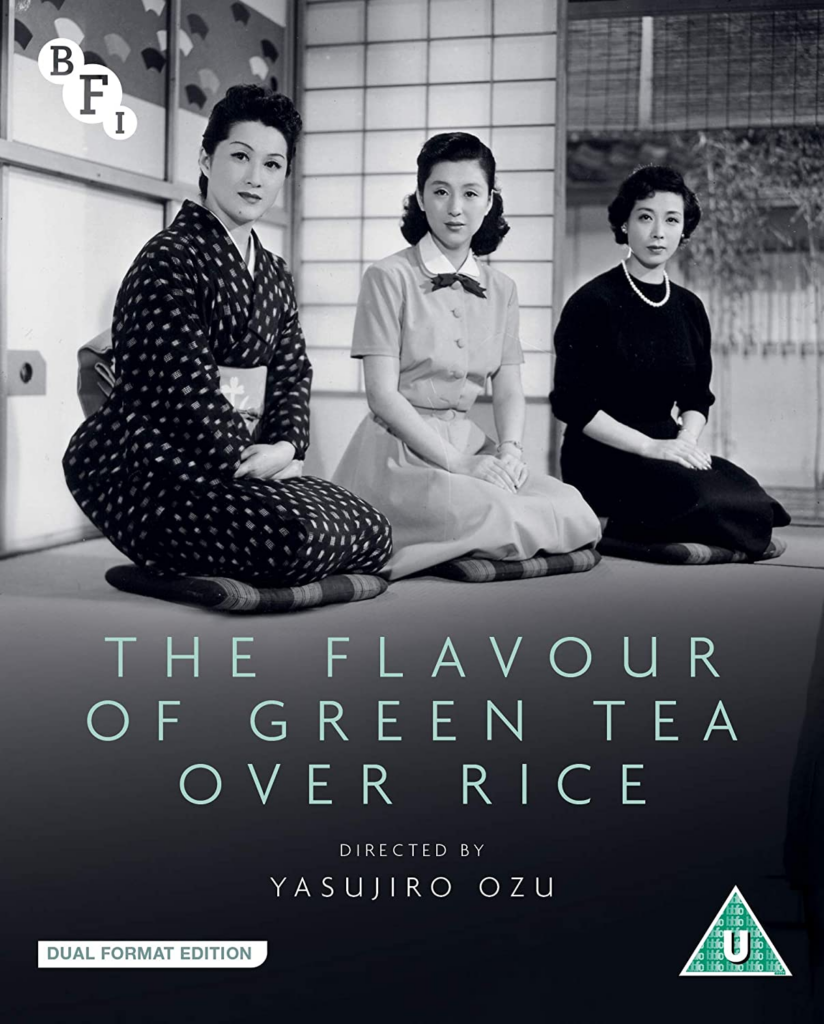
FLAVOR OF GREEN TEA OVER RICE, THE (Ochazuke no aji)(director/writer: Yasujiro Ozu; screenwriter: Kôgo Noda; cinematographer: Yuuharu Atsuta; editor: Yoshiyasu Hamamura; music: Ichirô Saitô; cast: Shin Saburi (Mokichi Satake, Husband), Michiyo Kogure (Taeko Satake, Wife), Koji Tsuruta (Non-Chan Okada, boyfriend), Chikage Awashima (Aya Amamiya), Keiko Tsushima (Setsuko Yamauchi, niece), Eijirô Yanagi (Yamauchi), Kuniko Miyake (Chizu Yamauchi), Koji Shitara (Koji Yamauchi), Chishu Ryu (Sadao Hirayama, Former Soldier), Yûko Mochizuki (Shige), Hisao Toake (Toichiro Amamiya); Runtime: 115; MPAA Rating: NR; producers: Shochiku/Ofuna Films; Platinum Classics; 1952-Japan-in Japanese with English subtitles)
“What The Flavor of Green Tea did have was a delicate flavor… .”
Reviewed by Dennis Schwartz
The film’s title is derived from the familiar dish served that acts in the film as a celebration of the simple taste in life. Renown Japanese filmmaker Yasujiro Ozu (“Record of a Tenement Gentleman”/”Equinox Flower”/ “Floating Weeds”) directs and cowrites with Kôgo Noda; it’s from a story Ozu wrote in 1940, but rewrote for this film when the army wouldn’t let him make it back then. Ozu wasn’t pleased with the film and is quoted as saying “this film wasn’t very well made.” But both the public and the critics loved it (I found it endearing), even though it didn’t have the same perfection in its story as his other top-grade films. What The Flavor of Green Tea did have was a delicate flavor that filled the screen with surprises, subtle insights about married life and many other bright spots. This very moving family drama differs from his other films mainly because it’s both playful and serious; there’s also a more active camera: a taxi ride through Tokyo, a cycle race, a train trip, a plane taking off for Uruguay, a professional baseball game, a Kabuki theater outing and a long scene at a pachinko parlor.
It opens in a light-hearted mood as four giddy women deceive their husbands to go to a spa by lying that they are with one of them who has taken ill. But the mood quickly darkens when the story focuses on one of those deceitful woman and her married life. The childless, middle-aged, upper middle-class couple–Taeko (Michiyo Kogure), the spoiled daughter of a wealthy businessman, and Mokichi Satake (Shin Saburi)–are going through a critical period in their bumpy arranged marriage because snobbish housewife Taeko is bored with her nice guy, easygoing, taciturn, habitual, and simplistic business executive husband. Coinciding with their marriage woes, the Satakes’ feisty niece Setsuko (Keiko Tsushima) refuses to go through with an arranged marriage. She calls the custom feudalistic and mocks Taeko because her arranged marriage is not going that well and therefore believes all such marriages won’t work. When Setsuko runs away from attending her arranged marriage meeting, she runs for help to the kind-hearted Uncle Mokichi. Unable to convince her to return to the meeting, he has her tag along with him and his protégé, the single young churlish office worker Non-Chan (Koji Tsuruta), as they go to a pachinko parlor–one that he accidentally finds out is owned by an army buddy from the war, Hirayama (Chishu Ryu).
When the president of Mokichi’s trading company dispatches Mokichi immediately to Uruguay on a business trip, he can’t tell his wife because she left home without telling him in person, leaving only a note that said “I want to have my own way for a while.” Taeko takes a train trip from Tokyo to a friend’s house in Nagoya (there’s a great shot of Taeko sitting alone on the speeding train as it passes over a trestle and Ozu leaves the camera on her for over a minute so we can actually see her thinking with no other action taking place–a thinking scene that is something rarely done in Hollywood; Ozu said he got the idea from Wyler doing it in The Little Foxes and Ford in My Darling Clementine).
Things get resolved when Taeko returns after her hubby’s flight turns back from engine trouble and she’s back home after receiving his telegram. Taeko sincerely apologizes for her surly behavior and making the marriage such a bumpy ride; they then chow down together over a meal he requests of green tea over rice (ochazuke), something she wouldn’t let her maid serve before because it was common people’s food but now realizes it’s what her reliable hubby really enjoys and that this traditional way of leading a simple life can also please her. Hubby happily states: “married couples should be like tea on rice.” In the last scene we amusingly observe the possible future couple, Setsuko and Non-Chan, awkwardly trying to make a love connection, with him dressed in a second-hand suit and with her frustrating his attempts to get along peacefully by playfully running away from him.
REVIEWED ON 8/28/2007 GRADE: A
© ALL RIGHTS RESERVED DENNIS SCHWARTZ